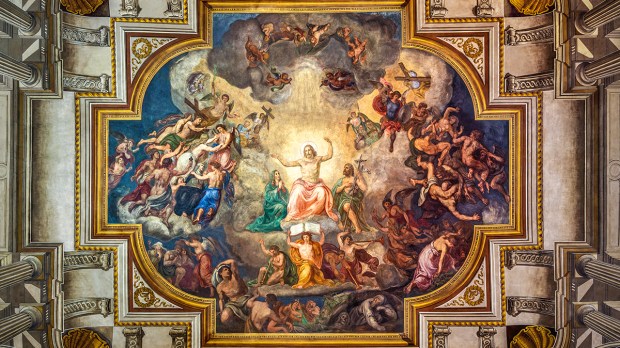Jesus urges us to address the Lord Most High God of Israel as Father, more particularly, as our Father.
Right away, Jesus has told us something of the Gospel, the good news of the Father’s unconditional commitment to humanity through Christ. To call God our Father is a summary of his abiding promise.
In calling on God, we have also asked for his Word. We are praying that amid all the words that crowd in upon us and around us, bringing uncertainty and division, the Father will speak to us clearly in a voice of truth that is all Truth.
Thy kingdom come, the next petition, flows from the first.
When we ask “Thy kingdom come,” we are asking God to exclude all the other kingdoms that intrude upon us, seeking our allegiance. Each wants us, each contends against that for which we have just prayed: the Father’s kingdom coming.
A kingdom, a dominion, bespeaks a power outside of us, over which we have no real control at all. We are in its grip, possessed by it. We get a sense immediately there is something dangerous about that word. There is an unnerving power stirring beneath us, around us, when a king begins to assert the authority of kingship.
But that is what we pray when we pray “Thy kingdom come.” We seek his kingdom in opposition to all others.
The good news is, we can hardly prevent his kingdom coming in any case whether we pray for it or not. As Tertullian (d. 240) not unreasonably pointed out, God’s kingdom will come without us asking for it.
If that’s the case, why pray it at all? We are praying ― this is easy ― that his kingdom will come also for us, and that we will have the faith to recognize and welcome it when it does.
We ask that the Father’s kingdom will come to us in a clear, conclusive way so that we are grasped, tightly held by his power, and more especially, that we are grasped and held by no other. So we pray, “Thy kingdom come.”
All too frequently, however, the Father’s kingdomlooks puny against the things arrayed against us. There are other powers loosed around us, other allegiances vying for our hearts. Against these, a distant kingdom coming appears too easily overcome by our despair, fear, confusion, even our conceits. God’s kingdom, this life says, cannot be relied upon, not for the real things we need.
How else to account for the booming business of becoming, in one version or another, the “best version of yourself you can be.” That’s one kingdom we are told to seek.
All the self-help advice and every motivational speaker, at bottom, tell us to construct our own kingdom, one of confidence, strength, purpose, vigor. After all, as we’ve heard, “God,” as Benjamin Franklin put it in his Poor Richard’s Almanack, “helps those who help themselves.”
But how should the best version of me regard the pain of age, the sense of betrayal when my body will someday refuse to obey my will? Or the frustration of soul-sucking grief accumulating by death and loss over the years; is that included somewhere in my “best version”? Thirty-three years ago, a 97-year-old told me plainly, he could see himself doing such and such but when he got up to do it, his body said “No, not now and never again.”
So there are other powers eager to dominate our thoughts and hearts, other powers jeopardizing our hope of the kingdom for which we prayed. You don’t have to look far. Looking closely inside of us we sometimes find nothing but our own fears, our own struggles, our own crises and cries, our own denials and addictions, our own bitterness and unfilled wants.
These are not the devil’s snares; these bubble up from within us. The devil may exploit them, but they belong first to our selves.
We get caught by these, paralyzed in faith, and we are not able to find within us the hope, the faith, or the courage to move.
Here, in that captivity, here is when we must pray, “Thy kingdom come!” It is a prayer wrung from the vicissitude of life, a cry for the clarity of our Father’s Kingdom rushing in upon us.
You, Father, is what we pray, you take hold of my life now in such a way that I can count on you in every faltering doubt, in every low and frantic moment. You, Father, you take hold of my heart now and wrest it to your control, because as you take hold of me, then I know I shall be free.
And he comes ― gently, lavishly in his Word, comes in the memory of Baptism, comes to us by those treasured words “The Body of Christ,” comes in such a way that once again our unsteady, wavering, and anxious heart — so easily dominated by all the threats of life — might once again find safety and surety in the hands of Christ.
“Our hearts are restless,” St. Augustine put it, “until they find rest in you.”
Previously in this series: Our Father, holy is your name
Next: Thy will be done

